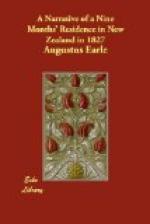The colony of Scotch carpenters, who had formed a settlement at the head of the river, and of whom I made “honourable mention” on my first journey, finding themselves so close to what they feared might become the seat of war, and having no means whatever of defending themselves, made an arrangement with Mooetara, the chief of Parkunugh (which is situated at the entrance of the same river), and placed themselves under his protection. They accordingly moved down here, which gave great satisfaction to that chief. Neither could their former protector, Patuone, feel offended at their removal, from the peculiar nature of the circumstances they were placed in. These hardy North Britons were delighted to find a reasonable excuse for moving, their former establishment being situated too far from the sea for them to reap any advantage from ships coming into port. Nothing can be more gratifying than to behold the great anxiety of the natives to induce Englishmen to settle amongst them; it ensures their safety; and no one act of treachery is on record of their having practised towards those whom they had invited to reside with them.
Mooetara is a man of great property and high rank, and is considered a very proud chief by the natives; yet he is to be seen every day working as hard as any slave in assisting in the erection of houses for the accommodation of his new settlers. He has actually removed from his old village of Parkunugh (a strong and beautiful place), and is erecting huts for his tribe near the spot chosen by his new friends; so that, in a very short time, a barren point of land, hitherto without a vestige of a human habitation, will become a thriving and populous village, for it is incredible how quickly the orders of these chiefs are carried into effect. I was frequently a witness to the short space of time they took to erect their houses; and, though small, they are tight, weather-proof, and warm: their storehouses are put together in the most substantial and workmanlike manner.
It is very difficult to make the New Zealanders explain the nature of their religious belief. One superstition seems general with all the tribes respecting the formation of the world, or, rather, of their own island, for that is the place of the first importance in their estimation. They say a man, or a god, or some great spirit, was fishing in his war-canoe, and pulled up a large fish, which instantly turned into an island;




